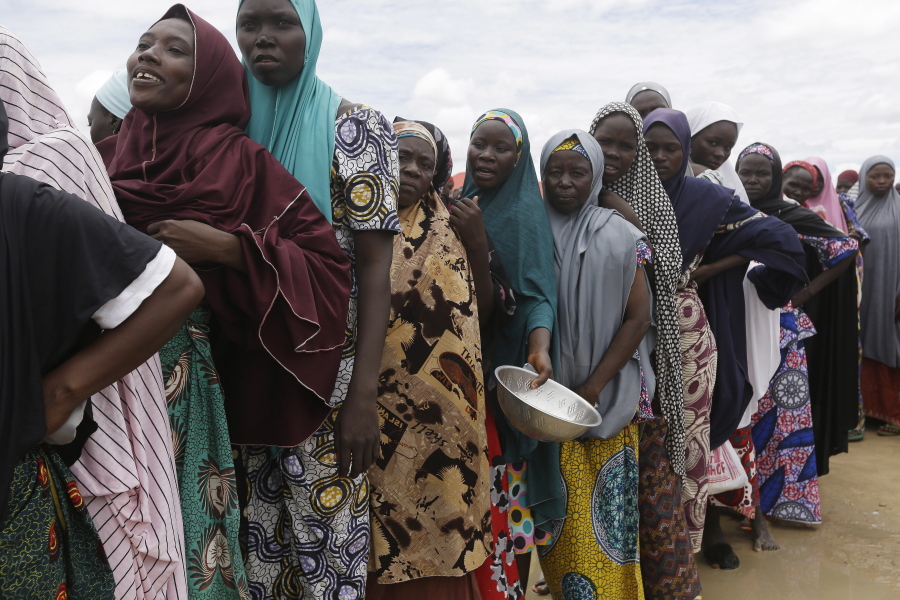MAIDUGURI, Nigeria — First, there was the bomb blast that killed eight people. Then, delays as soldiers demanded bribes to escort the survivors on their journey. Finally, the way was blocked by trucks mired in churned-up mud.
When the refugees from Boko Haram’s Islamic insurgency eventually made it home to a newly liberated town in northeast Nigeria, they found “people but no food.” Last week, as they made the hazardous trip for a second time with food and other supplies, a truck exploded a land mine, wounding several refugees.
But many say the dangerous journey is preferable to the hunger, humiliation and inhumane conditions in refugee camps where more than 1 million Nigerians, displaced by Boko Haram, are waiting to go home. Many are in Maiduguri, the biggest city in the northeast, the birthplace of Boko Haram, which has killed more than 20,000 and forced 2.6 million from their homes.
As Nigeria’s military pushes back against the insurgency and declares once-inaccessible regions to be liberated, more and more refugees are weighing whether to return.
The journey is just the first challenge. The returnees find firebombed homes, destroyed wells and the constant fear of attack by the extremists, who roam the region and keeps vast parts of it inaccessible. The fear keeps returnees from planting their crops, despite famine-like conditions that aid workers warn are already killing children and threatening hundreds of thousands.
“Nigeria is facing the worst humanitarian crisis on the African continent,” Peter Lundberg, the acting U.N. deputy humanitarian coordinator, said last week.
The Associated Press tracked returnees to the twin towns of Gamboru-Ngala, on the border with Cameroon, which Nigeria’s military liberated in August.
The towns had suffered one of the worst attacks by Boko Haram, whose fighters struck the night of May 5, 2014, in two armored cars stolen from the military, firing rocket-propelled grenades and assault rifles. They killed more than 300 people and destroyed almost every building in the towns, which are a major trading post on an international highway.
After the military declared the twin towns liberated, residents eager to return home were told to gather at a bus station on Maiduguri’s outskirts. But for weeks, they found little help.
“The government said we could return home, but for over a month now … we have been abandoned,” said one displaced trader, Baba Gana. “We have nothing to eat; some women are resorting to selling their clothing while others take to the streets to beg.”
Many residents said soldiers, who say they are not being paid, were demanding bribes to accompany them home. Nigeria’s military denied those charges. But truckers confirmed they have to pay the equivalent of up to $600 for military escorts.
This month, a group of residents decided to set out on their own. Before they even left Maiduguri, a bomb exploded in a taxi van, killing eight, according to the emergency management agency.
The determined convoy still set off, only to find the highway blocked by 18 trucks mired in mud on what used to be a paved road, according to Amodu Musa, secretary of the National Union of Road Transport Workers. He said they hired a crane and towing vans to pull out the vehicles.
“But when we got to Gamboru, we discovered that there were people but no food.”
Musa returned to Maiduguri to help organize a convoy of food and other supplies, and plead for a military escort.
That convoy finally got under way last week, with more than 200 buses, taxi vans, cars and trucks loaded high with returnees sitting on piles of yams and bags of rice and flour.
But the convoy had not gone 20 kilometers (12.5 miles) out of the city before a truck exploded a land mine. Several wounded returnees were taken to hospitals in Maiduguri, according to Brig. Gen. Jubrin Muhammed, but the rest of the convoy continued making their way home.
Last week, President Muhammadu Buhari launched a committee to draw up strategy for resettlement and reconstruction of the shattered region. People “have lost to everything to the insurgency,” he said.



